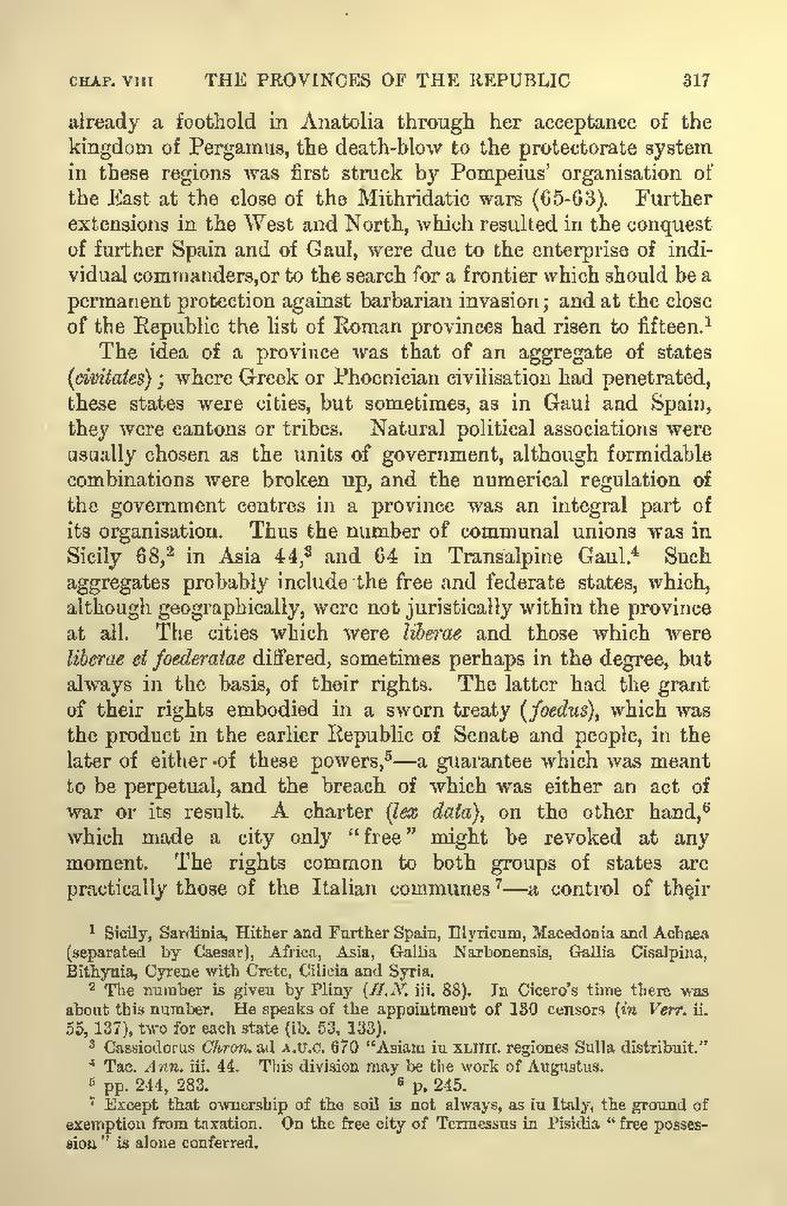already a foothold in Anatolia through her acceptance of the kingdom of Pergamus, the death-blow to the protectorate system in these regions was first struck by Pompeius' organisation of the East at the close of the Mithridatic wars (65-63). Further extensions in the West and North, which resulted in the conquest of further Spain and of Gaul, were due to the enterprise of individual commanders, or to the search for a frontier which should be a permanent protection against barbarian invasion; and at the close of the Republic the list of Roman provinces had risen to fifteen.[1]
The idea of a province was that of an aggregate of states (civitates); where Greek or Phoenician civilisation had penetrated, these states were cities, but sometimes, as in Gaul and Spain, they were cantons or tribes. Natural political associations were usually chosen as the units of government, although formidable combinations were broken up, and the numerical regulation of the government centres in a province was an integral part of its organisation. Thus the number of communal unions was in Sicily 68,[2] in Asia 44,[3] and 64 in Transalpine Gaul.[4] Such aggregates probably include the free and federate states, which, although geographically, were not juristically within the province at all. The cities which were liberae and those which were liberae et foederatae differed, sometimes perhaps in the degree, but always in the basis, of their rights. The latter had the grant of their rights embodied in a sworn treaty (foedus), which was the product in the earlier Republic of Senate and people, in the later of either of these powers,[5]—a guarantee which was meant to be perpetual, and the breach of which was either an act of war or its result. A charter (lex data), on the other hand,[6] which made a city only "free" might be revoked at any moment. The rights common to both groups of states are practically those of the Italian communes[7]—a control of their
- ↑ Sicily, Sardinia, Hither and Further Spain, Illyricum, Macedonia and Achaea (separated by Caesar), Africa, Asia, Gallia Narbonensis, Gallia Cisalpina, Bithynia, Cyrene with Crete, Cilicia and Syria.
- ↑ The number is given by Pliny (H.N. iii. 88). In Cicero's time there was about this number. He speaks of the appointment of 130 censors (in Verr. ii. 55, 137), two for each state (ib. 53, 133).
- ↑ Cassiodorus Chron. ad A.U.C. 670 "Asiam in XLIIII. regiones Sulla distribuit."
- ↑ Tac. Ann. iii. 44. This division may be the work of Augustus.
- ↑ pp. 244, 283.
- ↑ p. 245.
- ↑ Except that ownership of the soil is not always, as in Italy, the ground of exemption from taxation. On the free city of Termessus in Pisidia "free possession" is alone conferred.
